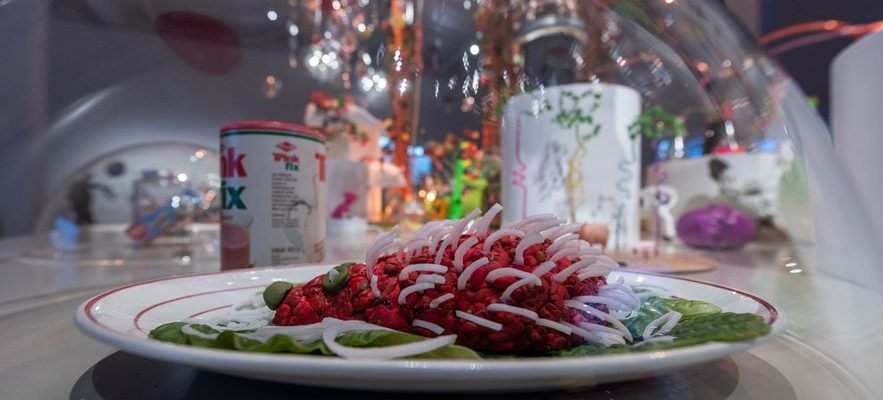This column tells the little or big story behind our foods, dishes or chefs. Powerful weapon soft power, A societal and cultural marker, food is the founding element of our civilizations. Conflicts, diplomacy, traditions, cuisine has always had a political dimension. Because as Bossuet already said in the 17th century, “it is at the table that we govern“.
Social media is sometimes cruel. During Emmanuel Macron’s visit to Germany last October to meet Chancellor Olaf Scholz, a user posts two photos which say a lot about the relationship with gastronomy on each side of the Rhine. On one side, the sumptuous dinner given by the French president at Versailles in honor of King Charles III, and on the other, the Elysian couple retching in front of a fish broocha smoked fish sandwich typical of northern Germany that you eat on the go at the market…
When it comes to cuisine, Germany blows hot and cold. 334 restaurants were crowned with a “macaroon” in the latest edition of Michelin, which salutes “the great diversity and excellence that characterize the German gastronomic scene”. This country, which saw the birth of the greatest musicians – Bach, Beethoven and Schubert to name a few – also gave birth to maestro Eckart Witzigmann, elected chef of the century in 1990 by the Gault and Millau. But in this land of game, we also find… the mettigel, a tasteless treat which features a hedgehog in the form of raw pork meat seasoned with olives to make the eyes, and pieces of onion to make the peaks.
A plastic “Mettigel” is placed under a glass dome during the “Future Food” exhibition at the German Hygiene Museum in May 2020.
© / dpa Picture-Alliance via AFP
If the culinary high-flying of Berlin’s Michelin stars cannot be called into question, it is a thousand miles from everyday food, as sad and gray as Hanover in winter. Jumble: the wiener schnitzel (breaded veal escalope), 1,500 varieties of sausages (currywurst, bratwurst, bregenwurst)the very famous kartoffelsalat or even theapfelstrudel (an apple pastry). When it comes to etouffe-Christian dishes, France has no lessons to give but it is clear that finesse has a little difficulty crossing the Rhine. How can we explain these opposite (and conflicting) destinies of the two neighbors? Let’s leave aside the incredible French terroir and its products which exist nowhere else. Let us also pass on the immoderate passion of the Gauls for banquets. Let us also forget the kings of France who raised the “arts of the table” to an unparalleled rank at the time…
The German aristocracy begins to hire the best French chefs
At the end of the Revolution of 1789 and the reign of Napoleon in 1815, France very quickly perceived the diplomatic potential of its chefs as a formidable lever of influence. Jean Anthelme Brillat-Savarin, the most famous French culinary author, saw the beginnings of gastronomic tourism emerging at the very beginning of the 19th century. The German aristocracy was tempted and began to hire the best French chefs in their castles. This is notably the case of the King of Prussia, Frederick II, who had his belly filled by the famous Perigord chef André Noël (1726-1801), capable of sending up to 80 dishes for the VIPs of the time, including the famous “Sardanapale bomb”, a delicious variation of stuffed cabbage. The times considered that good food could only be had with chefs from France. On July 7, 1913, the illustrious Auguste Escoffier, the pope of French cuisine, gave a memorable meal on a luxury liner where King William II was. On the menu: Russian-style hors d’oeuvres, cantaloupe melon, Madrid cold parfait, parmentier velouté…
But these orgiastic meals are reserved for a small elite, while the population gorges itself on potatoes, the flagship ingredient, symbol of absolute sobriety, says Karl Heinz Götze, full professor of German literature and civilization at the University of Provence. (Aix-Marseille I) in a fascinating note from the “Cahiers d’études germaniques”. Food is also historically an area of religious clashes between Catholics and Protestants. In his writings, Martin Luther (1483-1546) never ceased to denounce the gluttony – even drunkenness – of monks who think more about stuffing themselves than about alms. German literature, of the sentimental and neo-humanist movement, abounds with references to French cuisine. The author Matthias Claudius (1740-1815) does not hesitate to link “the decadence of the Roman Empire, adultery, the birth of opera, the existence of lawyers and castrati to the consumption of roast meat beef and wine. Worse still, this profusion of food would cause “serious illnesses”, according to Melchior Adam Weikard (1742-1803), follower of radical rationalism, in his “Advice on hygiene and health intended for ladies and gentlemen”. In their writings, Friedrich Nietzsche, like Heinrich Heine, are not very kind to German cuisine and its “tasteless dishes”…
Berlin, a capital of vegetarianism and veganism
Recently, a German who lives in Paris told me an anecdote: “When my friends come here, they look at the price and the size on the plate before sitting down.” Clearly, a good dish must be invigorating and inexpensive. Fortunately, this culinary apathy has not spread throughout Germany. The cosmopolitanism of the German capital has opened up to international cuisine and made Berlin one of the main world capitals of vegetarian and vegan cuisine.
Consumption of sausages, and meat in general, is in free fall. As Otto von Bismarck (1815-1898), the German chancellor, said, “the less people know how sausages and laws are made, the better they sleep.” Those days are over. Germans are sensitive to animal welfare and ecology. What if our neighbors across the Rhine ended up standing out with their “veggie schnitzel” or their “soy cervella salad”?
Our advices :
A book to reconcile you with German cuisine:
The German CookbookAlfons Schuhbeck, 2018, Phaidon (in English, not translated).
Two restaurants to eat the best of Germany:
Wunderbär, 16 rue Beaurepaire, 75010 Paris.
Le Stube Verdeau, 23-25-27, passage Verdeau, 75009 Paris.
.
